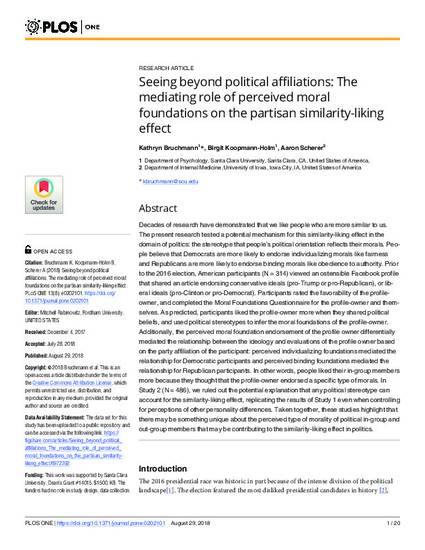
Decades of research have demonstrated that we like people who are more similar to us. The present research tested a potential mechanism for this similarity-liking effect in the domain of politics: the stereotype that people’s political orientation reflects their morals. People believe that Democrats are more likely to endorse individualizing morals like fairness and Republicans are more likely to endorse binding morals like obedience to authority. Prior to the 2016 election, American participants (N = 314) viewed an ostensible Facebook profile that shared an article endorsing conservative ideals (pro-Trump or pro-Republican), or liberal ideals (pro-Clinton or pro-Democrat). Participants rated the favorability of the profile-owner, and completed the Moral Foundations Questionnaire for the profile-owner and themselves. As predicted, participants liked the profile-owner more when they shared political beliefs, and used political stereotypes to infer the moral foundations of the profile-owner. Additionally, the perceived moral foundation endorsement of the profile owner differentially mediated the relationship between the ideology and evaluations of the profile owner based on the party affiliation of the participant: perceived individualizing foundations mediated the relationship for Democratic participants and perceived binding foundations mediated the relationship for Republican participants. In other words, people liked their in-group members more because they thought that the profile-owner endorsed a specific type of morals. In Study 2 (N = 486), we ruled out the potential explanation that any political stereotype can account for the similarity-liking effect, replicating the results of Study 1 even when controlling for perceptions of other personality differences. Taken together, these studies highlight that there may be something unique about the perceived type of morality of political in-group and out-group members that may be contributing to the similarity-liking effect in politics.

Copyright: © 2018 Bruchmann et al. This is an open access article distributed under the terms of the Creative Commons Attribution License, which permits unrestricted use, distribution, and reproduction in any medium, provided the original author and source are credited.